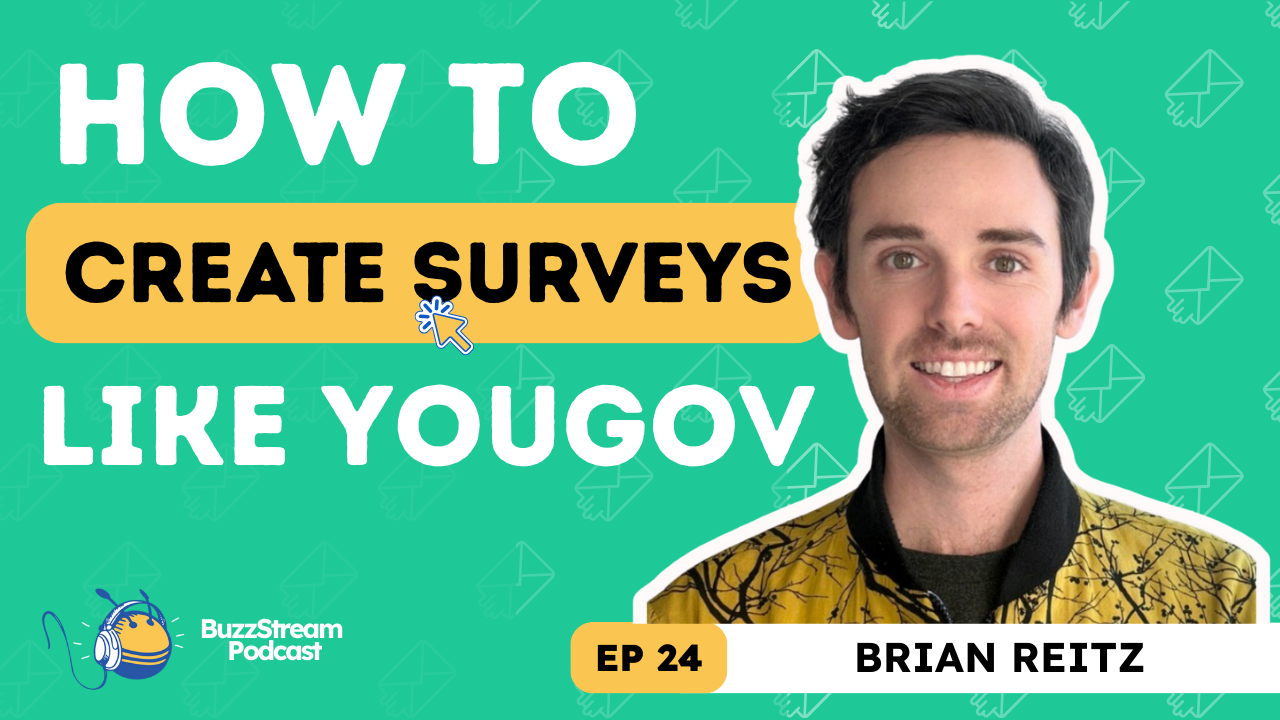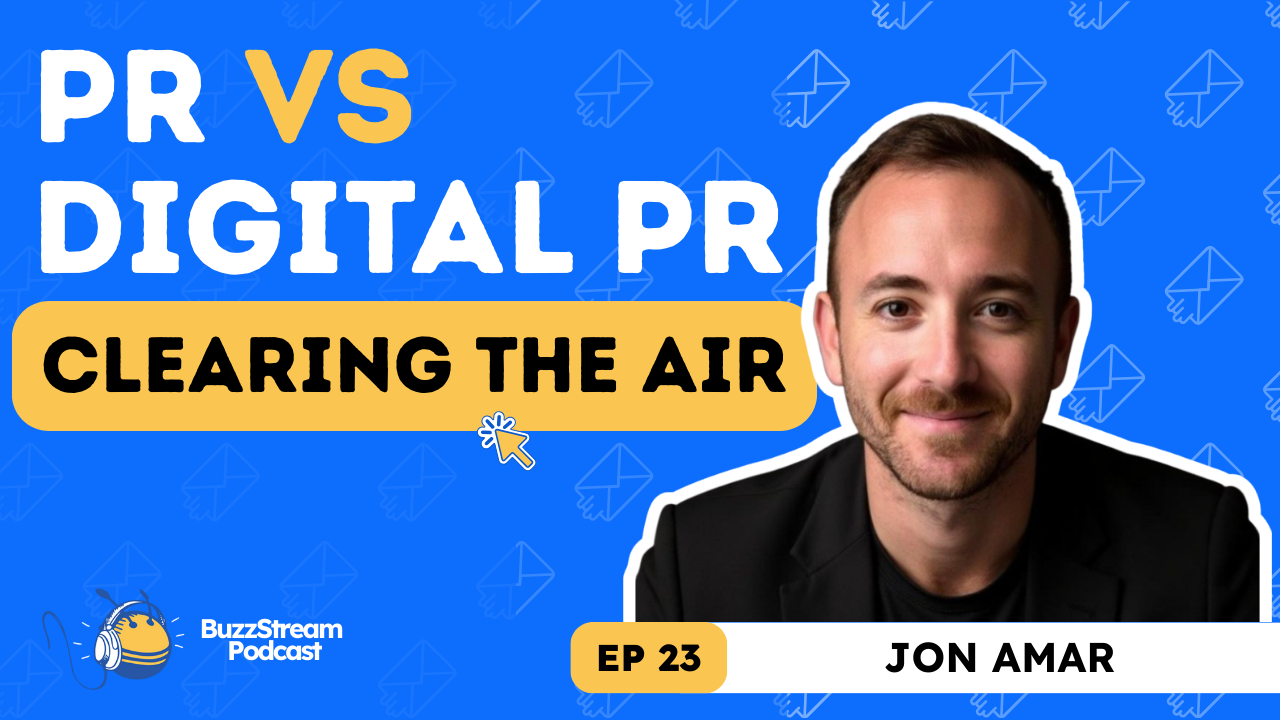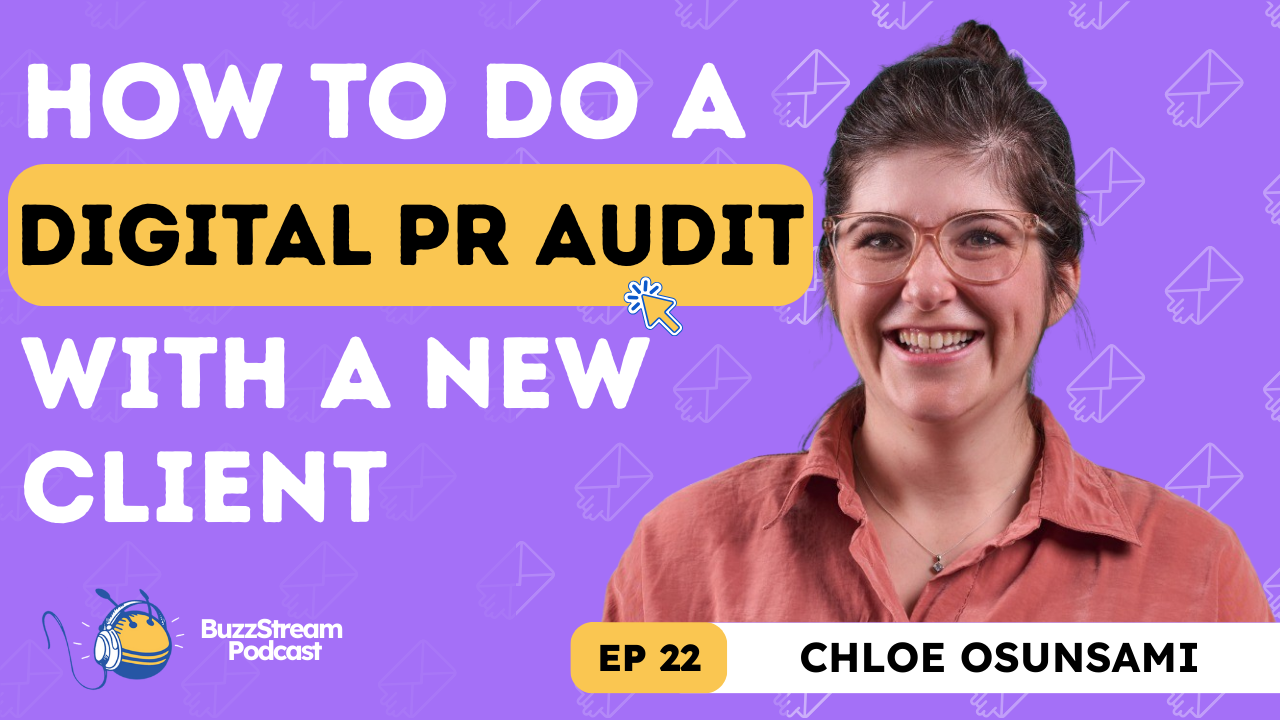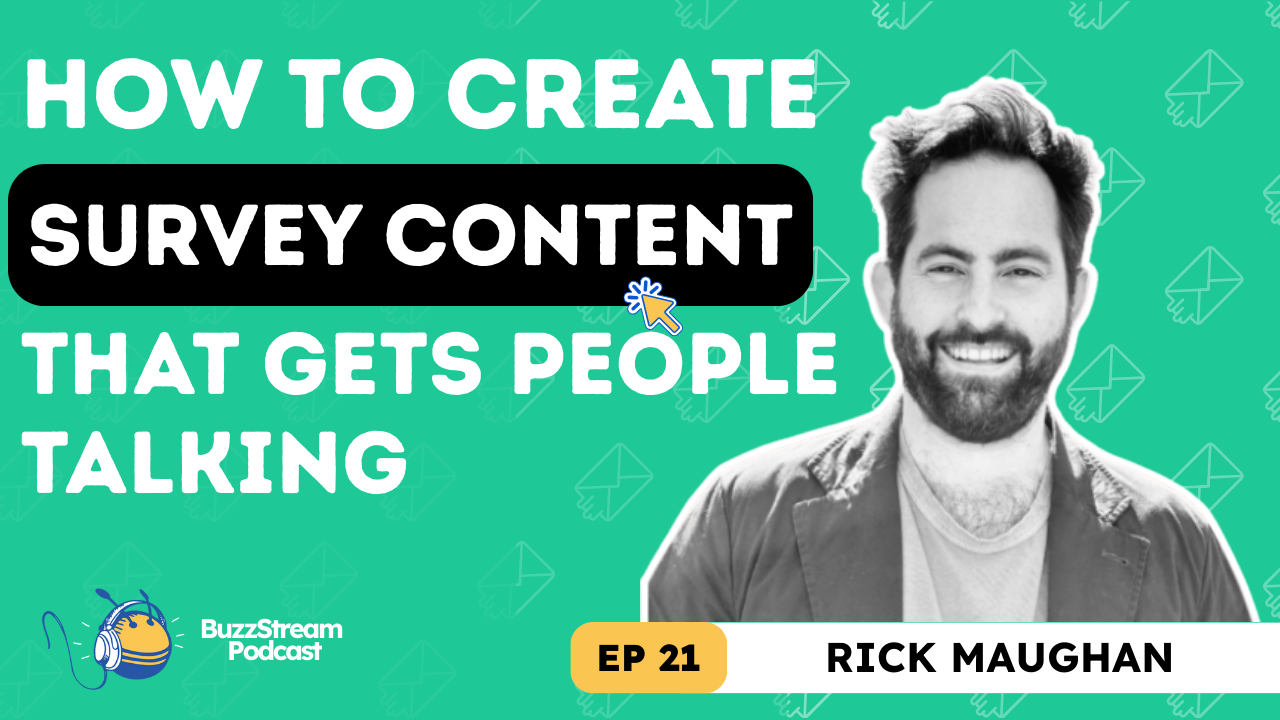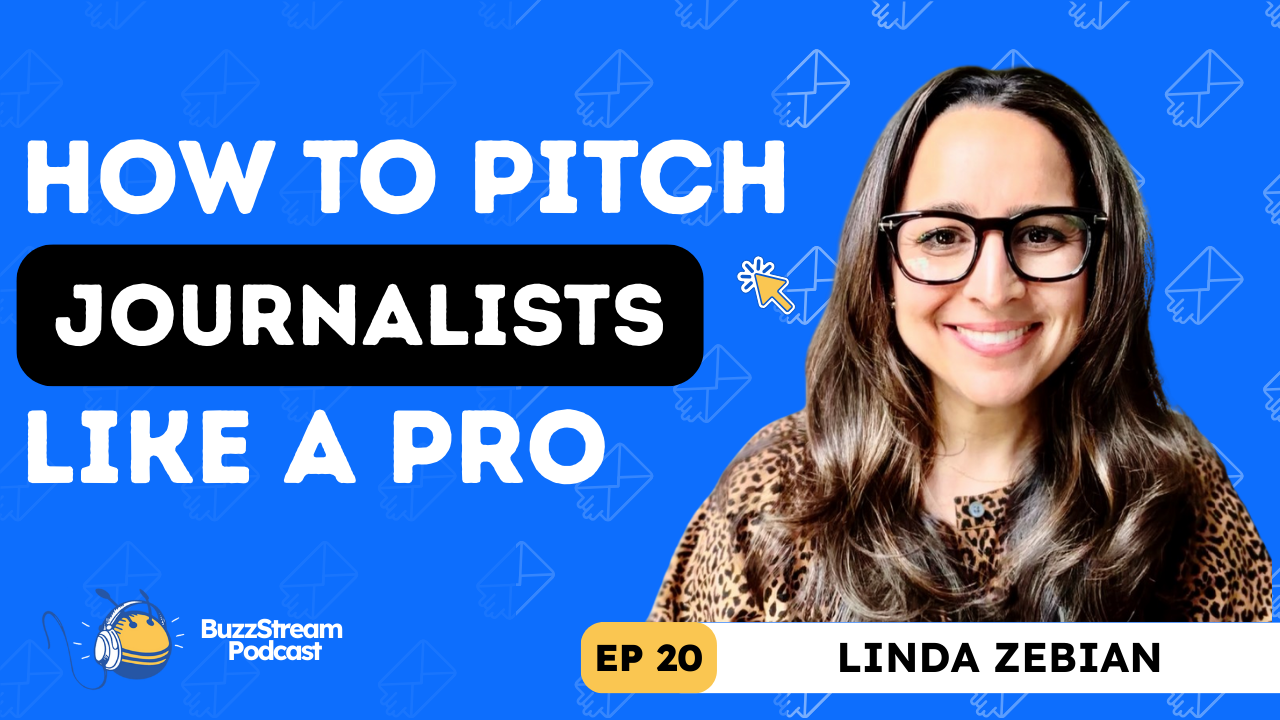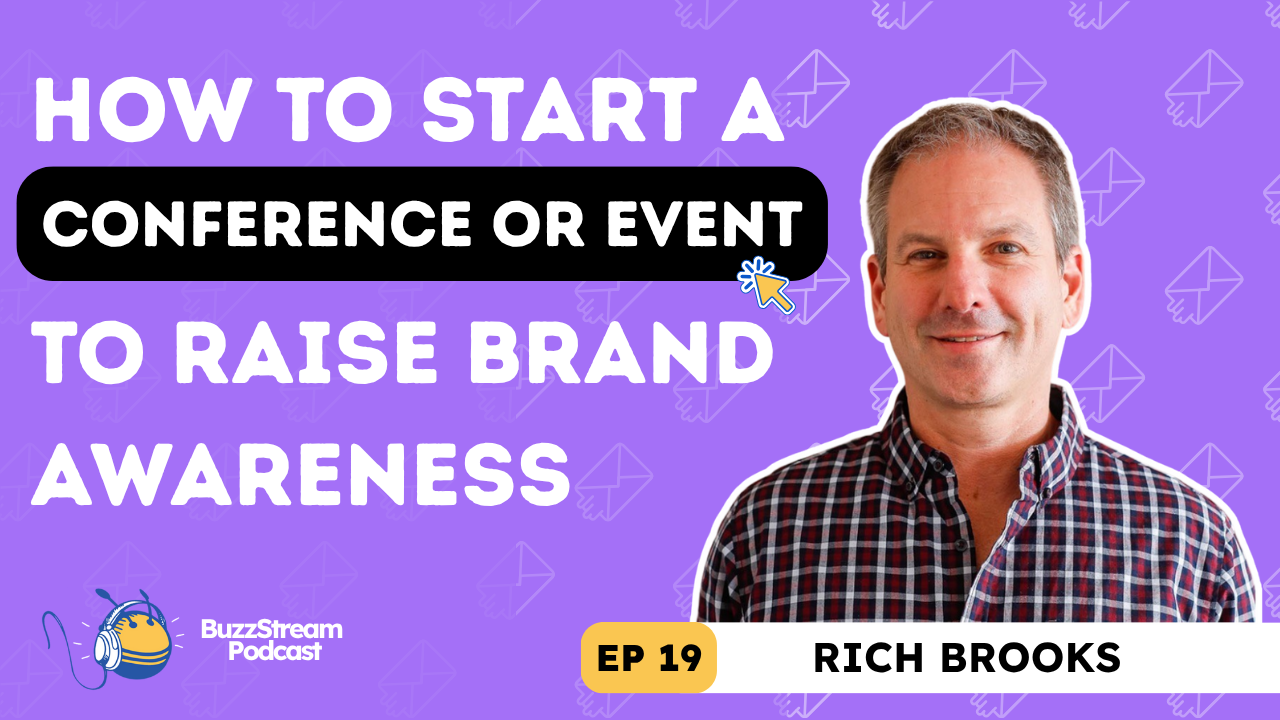I got a chance to speak with Chris Panteli initially when I was on a Digital Olympus panel (along with another BuzzStream podcast guest, Jasper Morris.)
Chris is the co-founder of UK-based digital PR link building agency, Linkifi. He’s also the co-host of the Market Movers podcast, where I was lucky enough to be a guest.
Chris really had some great insights into where the industry is moving, so I wanted to have him on the podcast to speak about one of the main hurdles link builders have: measuring success.

Transcript
Here is a slightly-edited transcript of our chat!
Can you define digital PR?
Chris: Yeah, sure. It, that, that is a tricky one just because PR is an old industry far older than the internet. And. But I come from a, an SEO background. And so link building for us, my answers are going to be from the perspective of like of a link builder.
And it’s probably been hijacked by link builders because it was seen as an opportunity to get awesome. Links. So the way that I feel about digital PR specifically is that it’s it’s link building, but it’s earned media link building. So you are editorially earning those links by giving value to either the journalists as an expert common piece or as a story, which the journalist wants to run with.
And then you hope with your fingers crossed that they link, back to your website. And if they don’t link, then you have systems in place to try and just try and get the link. But yeah, it’s a tricky one to nail down because there will be people businesses, brands where they’re KPIs and their expectations of undergoing PR or digital PR will be far different to that.
Be being offered from a traditional PR agency compared to that of an SEO based digital PR agency, if that makes sense.
Vince: Yeah. And that’s a great explanation. And I’m curious though do you run into that a lot where potential clients come in and there’s a mismatch between what they’re asking for and what you’re delivering?
Is there often a mismatch between what a client wants and what you provide?
Chris: We get quite a few client calls, especially as we grow in, and we’re starting to speak to larger potential brands. We do see the, their expectations in terms of deliverables in the way that we offer it to our clientele, which has been very much from that SEO orientated space does seem to be, I would say not aligned in the same way that they have.
Lower expectations and you can think of it like brands that may be run like TV ad spots or, huge bands, brands with big budgets and links might not be something that they fully understand or a fully expecting as part of that, like deliverable for a large ongoing PR campaign. So we see it sometimes with clients not fully understanding.
Digital PR as well in the sense that we are trying to earn that coverage with that end deliverable being the link. And we are trying to earn that coverage on behalf of the client by getting journalists excited about something. So it can be hard to explain to certain clients that there needs to be like.
A lot of leeway and flexibility in terms of the stories and the narrative that we’re going to try and get in front of the journalists, because you might sit on a client call with, 100 million a year SAS company that does email deliverability tool. But if they want us to get something specifically about their tool into mainstream media, it’s not something which like resonates with the new cycle per se.
So there can be a disconnect in that regard. Whereas if you’re speaking to the SEO manager of a large brand who wants links then they understand it. And then it’s just a question of, being on the same page in terms of how you can position the brand in order to get the maximum number of links the best, most highest tier coverage.
Vince: That’s probably a good segue into my next question, which is like you, like I also have a more of a SEO, like link builder background while I worked at an agency for a long time that did more of the SEO first approach. Like we did a fair amount of digital PR, but again, like I think it was more to support the SEO goals rather than.
Say just the brand in general, right? Like people weren’t coming to us for brand awareness and that sort of thing. So let’s talk about kind of your thoughts on how SEO and digital PR play. What role does SEO have in digital PR these days?
What role does SEO have in digital PR?
Chris: Yeah I think we’re in a golden era of those two paths crossing because I still think there is a place for traditional like link building.
And again, it’s niche specific, depends what niche you’re in. It depends what budget you’ve got. It depends what your SEO strategy is as a brand or as a business. It also depends on your risk tolerance. So I’m not going to deny that. If you want to rank high value money page in Google and you’re in the casino link, you’re going to need to be engaging in like guest posts niche edits with a healthy sort of ongoing never ending monthly budget towards those inner page link purchases simply because that’s what your competitors do.
And that’s what Google is determining what it’s going to rank and where it’s going to rank. We are now obviously seeing Google not be in the be all and end all of search. People are searching on different platforms. Traffic is, can be derived from not just Google but also the large language models now search GPT search is happening everywhere.
And I think it’s a wise assumption to make the, all of these tools, including Google are. Are best positioned to protect their business and their interests to surface trusted and valued content and opinions. And the way that we can achieve that and position ourselves as brands, as being trusted is by getting featured in other mainstream trusted media.
And then if that’s where we’re also deriving our links from, it’s like a win. Situation. So I think it like really fuels SEO as a strategy. And also if you are doing other SEO link building tactics, then it just gives you some protection as well, because you need to have, especially in terms of Google, like a natural looking backlink profile, you don’t want to just have a load.
Purchased links go into your money page. You want to water that down a bit with some like high authority, trusted links that look supernatural because they are, because you’ve earned them edit, you’ve editorially earned them as well.
Vince: Yeah. You said something at the end there it stuck out to me, this idea of, if you want to win in terms of Google you need the links, I guess my question and where my head’s going with this is you hear this a lot where it’s if Google didn’t exist.
Would these links still be valuable? How does that play into the strategy? If people are, the casino industry is like a great example of that. Cause I get what you’re saying. There are certain industries where link building is very important. It more of the traditional link building, maybe even like purchasing and it’s almost like a quantity Over, not over quality, but like it is a quantity game, but, sometimes you look at some of those links and again, like if Google didn’t exist, are those sites completely toast? Are those links valuable at all? Is it, or is it all wasted money? What does that play into kind of thinking through the strategy of, Digital PR and SEO.
What’s your take on quality links vs quantity links?
Chris: Yeah, exactly. And that’s my point is that if you’re going to engage in a link building tactic for the purposes of. Gaining your Google traffic or maintaining Google traffic. If that’s your core primary focus, then why not engage in a link building activity that has benefits above and beyond that of what you will get with Google?
So Google, obviously we need to build our EAT. We need to position ourselves as a trusted brand. We need wider visibility of being trusted and authoritative. So if we get digital PR coverage and we earned tier one media links, we’re ticking all of those boxes with Google, but we then have all these other like huge advantages to us as a business.
First of all, we’ve been featured in huge publications, so we’re going to get referral traffic. So that’s customers, maybe new potential customers or existing customers, either seeing you for the first time, or is it like another point in a multi touch point buyer journey? They’re seeing your brand.
Oh, I’ve heard of them. Oh, they’ve been featured here. Oh, they’ve been written about in this article. So you get in all of that. Then you’re also. Being able to tell your customers that are hitting your website, Hey, we are a clothing brand or we are a sporting brand. And look, we’ve been featured in men’s health Forbes, New York times, BBC.
So you’re going to instantly instill trust on the customers that land on your landing page and increase conversions for your customers there. You then also. building brand recognition, brand credibility outside of Google and potentially feeding a more of a controlled narrative into the large language models.
So if people are searching on new AI backed platforms like search GPT or Gemini, then where are these large language models getting their information? If they if someone’s typing in what are five good clothing brands to get running shorts from like. Where’s that information coming from?
If your brand has been featured a thousand times as having great running shorts or being an expert in providing running shorts, and it’s been in publications, which everyone trusts, it’s going to have, multiplier effect. So I just think it’s just a. Yeah.
Vince: I love that for one, like I am totally in alignment there and I’m thinking about, going back to your save, like these clients that might come in who have maybe differing values in terms of the brand worth, right?
Like you said, maybe it’s a hundred million dollar revenue. SAS company and they have budget to burn on PR and they want to do these like big tent pole, live events or whatever product in person things and billboards and that’s TV spots. But if digital is important to them and, more and more of users are gravitating towards this, for their buying journey, it feels like a win. Do you have those conversations with those? I guess the question is have you ever been able to convince someone? Who is more interested in the traditional side that something like digital. Is maybe a longer term solution for them.
Have you ever convinced an old-school link builder to invest in digital PR?
Chris: That’s a good question. I’m not sure about convincing. I think with digital PR it, it attracts a higher price. And I think once people. As an agency, once people reach us, they especially if they’re on a call, then they have an understanding normally of the value of the link and then we’re in a position to then say the additional benefits above and beyond that.
We have had. The one thing which I have noticed a lot is especially in SAS as well is people thinking that PR would be a great way to digital PR. This is a great way to publicize maybe a new tool feature or a new part of their business model, which obviously it can be. But again, that can be a tricky, a trickier sell simply because if we’re offering the link as the KPI and the quality of the link, then that’s a, it’s a trickier thing to do is to get a new feature of quite a SAS tool that maybe Not be that sexy to get that mentioned or quoted in mainstream online media is trickier.
And that’s probably where maybe traditional PR or like press releases or social media might be like a better way for them to achieve. The results that that they’re looking for. So currently the link, that high value link is the core offering. And then the other benefits are many, but additional. And we’re also in a super, this Vince this industry is changing so quickly and then everything around it is.
We can’t breathe at the minute with these Google core updates. Like they just released another one and it’s everything is happening. So as GPT comes out, Google might be getting split into two, three parties. It’s just impossible to keep up. So
Vince: yeah it’s wild times for sure. And it yeah, let’s get into kind of the successes and measuring success.
Cause I think that probably plays a lot into this because what used to be a Was link quantity years ago, right? Didn’t matter where you’re getting them from, users got them. And as we’ve seen, fast forward to 2024, helpful content updates, a few link spam updates. We’re really seeing this quantity thing go out the door, right?
It’s all focused on quality relevance. So let’s start there. How do you measure success for your clients? Digital PR. Cause obviously to caveat that as well, or build on that as well as there’s the organic traffic side there’s like way more, there’s the SEO side of things, not just links. So yeah, how do you quantify success in Digital PR.
How do you quantify success in digital PR?
Chris: Yeah. We’re not a full service SEO agency. Also. We only do. Digital PR link packages. And therefore our like KPI is that off fulfilling that client order with the set number of links they bought with the the best possible quality links that we can get for them.
And the way that we measure. The quality of a link is DR, which is Ahrefs like third party metric Ahrefs estimate of the domain traffic. And then also the relevancy as well. And that can be on a domain level like topical relevancy on a domain level or an article level, or it can even be like on a contextual level, just on the quote obviously the higher all of those are the better we are.
Launching a new service where we’re going to be doing target page sprints fueled by digital PR, because we just see so much success for our clients that are doing SEO themselves, but, and, by digital PR links from us, you can just see. Everything is going up. So a well executed SEO strategy with digital, like digital PR links.
The success is obviously in an increase in traffic for the customer more sales, more conversions, more calls booked. Whatever you want to say. But because we’re not full service and we don’t currently do the SEO for us, our success is delivering, five or 10 of the creme de la creme PR links.
But like I said, with our new sprints and obviously we are SEOs as well, me and my business partner. So once we’ve nailed down that strategy then. We know we can see huge, significant improvements just because, especially a lot of like local service businesses and stuff that they’ve got great businesses.
And maybe they’ve been with like an SEO agency for five years paying a thousand dollars a month for two guest posts. And maybe like you said, high volume of links that are crap, 20 links off fiber or something like it’s just doesn’t work whereas, some well optimized content, some good internal links and some amazing high authority homepage links can be all you need to have like a roofing company go from spot four on page one of Google up to spot one, which to them is like hundreds of thousands of.
Dollars or pounds or wherever you are more revenue. So yeah, everything fueled by digital PR is the way that I would see it. And I would measure the success in the quality as well actually just to add to that cause I do see many, I do, this industry is fast moving and relatively new ish, I would say as well, and I do see people.
Like flogging digital PR, but it’s not digital PR. So this is something that I try and talk about on social as well. And I just tell people to be careful just because it really should be earned media and like buying a newswire press release where you get like a thousand links off, you’ve seen them.
There’s like kwhnews. com. There might be like a Yahoo in there or whatever. Yeah.
Now there’s nothing wrong with a good syndicated link. We got a client, a link the other day that got syndicated onto Forbes, happens all the time. Like that’s great.
But if you’re paying for a wire release for 200 links. There’s just, there’s zero value. So I mean that there can be value to that. Like I said, the clients that have got a new SAS tool feature that they wanna get out there as much as they can, then paying 200 quid to have a press release done, you can then publicize the press release more on social media.
So there’s like a place for it, but not to fuel your existing SEO efforts and to have that like growth trajectory. Yeah, it’s, there’s. That’s where digital PR comes into its own.
Vince: Yeah. Yeah. A hundred percent. And to dig into it a little bit more. So do you, does your team is linkifi create the assets as well for people or are you using existing content?
How do you actually generate the links for clients? If I, if most stream came to you and was like, Hey, I, I’m going to get 10 links. What, what did, what do you do?
What kind of strategies do you use at Linkifi?
Chris: So we reign we execute a range of digital PR strategies. So we’ll do expert inbound expert commentary which is maybe we should all just take a moment of silence for the death and demise of HARO, which was recently HARO being the biggest proponent of this sort of link building, but albeit.
Not the only one it was in a slow decline for a while.
There are many other places to find these. Journalists requests. And we define that as inbound. So that’s you as a business, as a brand, as an individual, that’s you waiting for these requests to come in. So that would be a journalist either utilizing a platform or their own social media saying, I’m writing an article for this publication and I need an expert to give me two or three sentences in order to put it in my article.
And obviously for the journalists that enhances the credibility and the quality of their article. And for us as potential contributors to that expert commentary request if they like our quotes and they include us, then we’re going to be featured and quoted in an amazing publication by a great journalist and also get a link.
So that’s inbound. And obviously some clients are perfectly aligned for that because let’s say. We were doing a buzz stream and you came to me, Vince, and said, yeah, you can pitch the media as me. I’m a marketing PR expert. Then bada boom, bada bing, that’s great. Some clients are less suited. Maybe it’s a very large company and they don’t want anybody like publicly speaking without everything.
Yeah, or maybe the industry is just like not interesting at all. And it’s better suited for another type of PR. So the other types Oh, actually the other thing to say inbound is a bit more us centric, I would say. So you get journalists more. From the U. S. Publications, your Forbes, your New York Times and New York Posts.
They are a bit less receptive to the outbound PR, which is traditionally more like a U. K. Centric thing. So not to say that there isn’t both on either, but yeah, a bit more U. S. Centric on the inbound, get some great links and also many of the publications or The journalists that source for the publications via the inbound expert commentary on platforms like harrow now defunct or press plugs quoted editorial all the other ones many of those journalists write for publications that’s the only way to get a link on them.
They are just not receptive to they don’t have journalists like in a traditional sense that are like looking at their inboxes in order to. published stories. They’re very high authority publications, but they maybe have an editorial team, an editorial calendar, and they’re just not open to any other anything else.
So the only way to win those links and that coverage is by answering the journalists or the writers that are requesting for expert commentary. Then on the other side, we have outbounds. So that’s where Rather than waiting for the journalists to come to us, we go to the journalists, and that’s where we have an ideation session.
We come up with stories that are interesting, but also will be good for the brand. With relevancy. Obviously the dream is to come up with something that could go viral. And then we build a list of journalists. From a media database, either journalists that we know have covered a similar story in the past, or we know will be receptive to this type of story based on the beat that they work in.
And then we send those stories off and we do followups. And if the story doesn’t work, we rework it, we send out again. So forth.
Vince: And with those stories, are you, are those like content led or are they call like asset less? Is it, does it live on the blog somewhere and then you’re pitching that or is it just a data piece or something?
Do you create assets for clients to pitch?
Chris: Sorry, I was talking, I was so into telling you that answer. I’d actually forgotten your original question, but I was getting to that. So yeah, on the inbound. Obviously, that’s just you are just providing expert commentary on behalf of the expert representative of the website on the outbound.
That’s where we’re looking at what we’re doing, how we come up with the stories, where are we getting it? So firstly, the first thing we do is we have quite a robust onboarding system because some companies are sitting on PR gold, and maybe they don’t even know it. Maybe they have got like a shit ton of internal data.
Maybe they’ve got internal tools, stuff that is just, you could just say it’s so interesting. Can you tell us this? Can you tell us that based on your own internal data? So that’s the first place that we look as part of the onboarding. What internal data have you got? What internal data would you be happy to share?
Then, so that’s the best and best place you should always look. Obviously that’s not every company. A lot of companies don’t have interesting internal data. Maybe they’ve got interesting anecdotes or stories. They can put all of that in the onboarding, but that’s the really good place to look.
Then what we would do is we would look whether or not we’re going to be running reactive campaigns or data led campaigns. And reactives is where we’re looking at what we can react to with what’s happening in the news right now, or what we know will come up in the news. So for example, everybody knew Halloween was coming up.
Let’s say we took on a client that was a blood bank. Maybe let’s say it was a blood bank client. We know Halloween’s coming up. Maybe we could do something really interesting with that. We’re going to react to Halloween. The really interesting story from a blood bank because blood and Halloween work together off the top of my head, or maybe we say, Hey, we’ve got this blood bank.
They’ve got loads of amazing internal data about like people that give blood. And apparently like. Loads of people in one particular state give way more blood than anything else. Maybe we can get all of that data and we can come up with this amazing story. Would you believe it? Southern states in America give 75 percent more blood than any other state, something like that.
But obviously you need to take the data, analyze it, see if you can find the narrative, find something that’s interesting. If they don’t have their own data, then we can look to. Scrape or source data on our own that fits with the relevancy in the niche of the client that we think is really interesting and we can put the story together.
With the blood bank, maybe they’ve got no data, but maybe we go look, you’re a blood bank and it’s coming to Halloween. We’ll go and find out, let’s say. Who gives the most blood in the UK, let’s say, and we can do that by maybe scraping publicly available data. We could do a freedom of information request, which is the UK the U S has something cinema as well, but they have to give you the data and we could find a story that way and just final point, a great thing, which we can do then is we can have that as a content piece.
As an asset live on the client’s website, we could also create infographics or other interesting things from that, which works really well, especially if it’s like a visual if it explains an interesting idea in a really visual way that can then live on the client’s website. And that can attract links naturally over time as well.
And it’s also a great asset to, for them to have in the future.
Vince: I love that kind of toolkit there, and the reason I wanted to ask that was cause I know. Like a lot of that stuff can overlap SEO teams, right? So there’s an SEO team in house and maybe you’re creating content for their site, for their blog or for, you mentioned some of the, say they’re releasing a new product or they have a target page or something that they want to build links to.
So to get back to the success piece of that, where do you and how do you play with the internal team, like on the client side when, Say they want 10 links or something. You go and get them 10 links. Is that it kind of stories over there? Or are you also looking at organic traffic?
You’re going to look at direct traffic, referral traffic. How involved do you get with these clients?
Do you interact much with SEO teams?
Chris: Currently we don’t, we deal with a lot of SEO managers. We deal with a lot of marketing teams from companies that will have hired us as part of their broader link building strategy. So like I said, that’s something we’re moving to just because we deal with a lot of clients, varied clients, and the clients that we have that know what they’re doing, or at least have an executable SEO strategy in hand in terms of their content and on page, everything else that they’re doing and they just.
Saying look, we’ve got this covered. We’re buying guest posts here. We are doing new shed is, or maybe they don’t do any other sort of link building, but they’re doing like great content pieces. That’s being pushed on social and they’re doing all of that good stuff. And they just using us for the digital PR links.
You can just see, we can, we do, I do look in a trace on a client by client basis, especially when we’ve wrapped up like an order and was want to see if they reorder of clients are less SEO savvy. Although it’s an amazing thing to still do, you should always build PR links in my opinion. It’s they’ll last, they won’t degrade.
Then they’ll have all of those additional advantages outside of just like the SEO value, but it’s going to be less effective than if you are implementing like a good holistic SEO strategy as well, which is why obviously we’re going to be doing this sprint sprint fueled by SEOs, just because we know, especially in things like local or less competitive spaces or industries where just no one else is doing it, like you’ll see a big difference quickly.
Vince: Yeah. Elaborate on that. Cause even though you guys don’t do this, like you’re only a piece of the puzzle, obviously, like with your SEO background, you understand where you fit in the puzzle. So what should people be looking at? If they’re hiring you right to build links, especially for that, the people who are not SEO savvy.
It’s okay, I got to build links. What are the secondary benefits of that outside of just like here are links? What should they be looking for? What is success? What successes come from the link building that the sort of PR links that you are building?
What are the secondary benefits outside of just links?
Chris: In, in recent times, what we found is it does build a more of an algorithmic protection from Google.
So having even just a basket of decent digital PR links will be, have less of an impact on sites that potentially are going to be. Have been hit algorithmically, by a change in Google’s algorithm. So it, it can provide that fortress, it can also reinvigorate a website, which is plateaued.
We see that all the time. And most, most of our clients are S-E-O-S-E-O savvy to the point where they’re, they are implementing a strategy, which is working. Not many people come to invest in digital PR if they’re like on a downward or like downward and flat. Trajectory. Normally, things are going well.
They’re then looking to outsource and grow. I think there’s been a big shift in public perception of link building in recent months. And even the last couple of years where we’re becoming more and more picky and choosy and wary of where we’re buying our links from. And The impact and the safety.
We went through the, mass manual de indexation of websites the spam link penalties that were given to websites. So it’s an era now where most people that are at a point where they’re ready to make an investment in digital PR, they are, they’re doing well enough to know that it’s going to have a positive impact and it’s just a safe.
It’s PR, isn’t it? That’s what Google wants to see and that’s what should happen to a business that’s doing well. They’re going to get talked about on the internet by big brands and publications. There’s just.
Vince: Yeah. Totally. That makes a lot of sense. And I’m wondering too, now, like we’ve talked about the higher end.
Links, right? Like the top tier media links, well known authoritative, do the other links just not have value? Like, where do you see that? These links that, maybe I start a blog. It’s a great blog. It’s got great quality content. I put a lot of effort into it. I’ve got little to no traffic because I just started it, but it’s written by someone who knows what they’re talking about.
Does that have value? Like, how do you quantify something like that for a client who might look at that and just be like say it’s highly relevant, obviously, but it’s a low DA, low DR, low site traffic. Does that not have any value?
How do you feel about low DR, highly relevant links?
Chris: Is this the link we’ve built for them, or my opinion, if I saw that they got these links themselves?
You obviously wouldn’t build them, right? Because you have those minimums, right? But yeah say, maybe they built it naturally somehow.
Chris: Okay. Yeah, I do think that there is still value in That sort of link building. And I think it comes down to a number of factors, how competitive your specific industry is.
I think, like I said, more competitive industries is not a question of is there value? It’s you have to do it just to maintain rankings like casino, very high competitive industries such as that, but also. We shouldn’t just blindly trust third party metrics of like tools like Ahrefs or SEMrush and just say, Oh, this is a DA, a DR such and such.
It’s a massive DR and therefore it’s a great link. Or, Oh, this is only a DR 20. It’s a rubbish link. It definitely doesn’t work like that. And if you’re in the SERPs or you’re working with clients and you’re testing and you’re watching, you will see this as well. I spoke to Dennis Yu recently on our podcast, and he was talking about how he does this like networking thing with a lot of local businesses.
So already it’s starting to sound a bit like three way link exchangey, which is like, Oh no, that’s like a terrible thing, but it’s not that. What he’s saying is, Hey, look, if you’re a dentist in the Chicago area, and you can network with dentists from all over the U S dentists in States, miles and miles away from you, is it not a great thing for you as a dentist in Chicago to get a link from a small dentist in Illinois?
He’s never going to compete with you, but he’s a real business that’s been like online for decades. It makes sense for him to maybe link to a piece of content that’s come from your site. And he links to a piece of content from your site. It might be like a da 20 or da 30, but that is such a relevant link that it’s, it’s going to be super authoritative and powerful.
And especially if he links to a piece of informational content on the Chicago dentist website, and then the Chicago based dentist has internally linked from that informational Content to one of their service pages. Like you’re really starting to understand the game now and win with these working like that.
And then add PR links on top of that, just to say, everything’s good here. And yeah,
Vince: I like that as the yeah everything’s going well where, yeah, nothing to see on the other side. The thing that kind of, that, that spurred for me is this idea of okay, so you got digital PR links going, right?
Are there ever any instances where other link building might the digital PR, or have you ever had any instances where a client is doing a specific type of link building and you’re like, ah, you should probably not be doing that. And it can almost nullify the digital PR top tier links that you’re doing.
Have you ever had to tell a client to stop link building?
Chris: Yeah, I did. I did. I used to be in, in the operational side, like a lot more, and I would see, we have alert alerts set for all clients obviously we don’t want to miss a single link. We have automated alerts on the clients. Brand name, the person that might be quoted across multiple platforms, plus manual searches, daily, weekly, monthly.
So anything that comes in, we will see. And I did used to see this a bit more maybe 18 months ago where we’d have a client that we’d be building amazing links for, and then. Like it would come in that they’d got like these other five links. And it’s okay, were these us? And we’d go no, these are rubbish, rubbish links.
These are paid for guest posts. Obviously you can smell them from the screen. They’re just so obvious. So I would think. It’s not us, they must be doing this additionally to, to PR. Is it going to move the needle for them? Again it depends how and what they were doing. If they bought a thousand links off Fiverr that all went to the homepage, let’s say, then that’s not going to do anything.
If it was. A dentist that had a money page that was spot four on Google and his three main competitors above him had one or two links each going to their money pages. And he just bought a couple of links. So we had two or three more than him and then it pushed him up. Because he was also doing digital PR then that’s like a great strategy, isn’t it?
It’s also risk tolerance though, will that work forever? But then also long term is links going to be something around forever in, in Google, which again is why for me, if you’re going to invest in links, at least you get all the additional benefits from the digital PR links as opposed to.
Vince: Yeah, that makes total sense. Yeah. I, I remember getting into a fight with another agency, like a previous agency that a client was using, because we just found like a ton And they might’ve actually still been using them in addition to us. Like we were creating more content driven PR link building assets, and they were doing more like traditional, resource page and broken link building and that sort of thing, but they had created, it was like a fragrance company and they had created like.
The history of beekeeping or something was like this asset on their site. And they got like a ton of links to it, but we were like, man, this has nothing to do with fragrances at all. And so we got in this fight with this link building company because they’re like, Oh, look at all these great links.
And we’re like, yeah, but it’s not doing anything. And our thought was like, it’s what, it’s potentially, I’m going to call it weighing it down, right? Like it’s weighing our efforts down in a way where it’s, um, if you think of the link profile of a site, it’s Google probably looks at it at the averages of it’s got a lot of high quality ones relevant.
And then there’s these other ones down here, low quality, but they’re relevant and then. Low quality, low relevance is like dragging that value down. Yeah, I feel like when you get into successes and failures, for clients, like it does insights in general, like it, there is a lot of, it depends.
There’s a lot of circumstances, a lot of, yeah, mitigating, circumstances. But I think the thing I’m hearing from you a lot is it really depends on what the competitors are doing. It sounds like that. is something that drives a lot of the strategy and kind of just even the thought process of like where these brands are at.
Is your strategy heavily dependent on what competitors are doing?
Chris: Yeah. Yeah. A hundred percent. Yeah. If you’re a mom and pop blogger with a thousand monthly organic sessions, and you’re making 200 bucks a month, then you know, digital PR link building is not something I would recommend in a Do everything else first content. Make sure you understand what it means to rank, is organic Google search traffic should that be your main focus is that somewhere that’s you should set yourself up for the longterm or the medium to longterm.
Could you. Could you blow up on like on, on a different platform? That’s not Google. In which case you would never even need possibly to consider link building, like paid for links. You may want to consider digital PR in the future, but all of these things are to take into account. Whereas, if you’re like, I had a client on the other day who makes like loads and loads of money for his local service business from Google.
He hasn’t really noticed the latest, what, three updates. He’s just seen one other competitor come in and nudging above him on a few keywords, which to him is like a shit ton of money every month. He’s losing. So he wants to get that back. So how does he do that? He’s got to look at the two things that move the needle in Google organic rankings, which is content and links.
Like it 100 percent makes sense for him at least now to go. Okay. I don’t want to be underneath this guy on this keyword. Like I need to be above him because I make double the money or whatever it is. So it’s, yeah, it’s so many variables, but yeah, looking at your competition has got to be one of them because.
Do we want to beat our competition or we don’t want to lose potential earnings from our competition? You must know this with BuzzStream, you’ve got competition, Vince, you’ve got to beat them. I know.
Vince: Yeah. Yeah. And yeah, again, like the, it’s not just even competition that drives it again, like I heard you say the site it’s yeah.
What does success look like? What is, the current situation for you right now that. Success in link building might be different. And it was obviously like a few months ago, even, or a few years ago. So I guess it’s a really tough thing to quantify success and define success. There’s really no line in the sand or like hard definition that you can say with this.
We can save links, quality and authority right now is the most important thing, but who knows, maybe Chris, I’ll have you on in a year and we’ll. Recap this and see what has changed.
Chris: Yeah. That would be great. I’m 100 percent focused on seeing where the LLMs are deriving their, the information that they surface.
I’m very much of the opinion that it’s going to be about. Links, I think one day it’ll be maybe less about the actual intrinsic link itself, but the brand mention, I think that’s going to be maybe as important as the link, actually, I think you may have even mentioned that when you’re on my podcast which can be earned in the exact same way with doing digital PR and getting featured in these publications, but to see where.
Where this new avenue of search will, will take us at the end of the day, we want to be optimized for everything because we want to appear everywhere so that we get faces on our service, on our product and we make money. So yeah, it’s going to be interesting to see where it goes. If you’d have asked me 12 months ago, what would we be talking about 12 months time?
It’s. So you’re spent on it.
Vince: Yeah. Yeah. It’s wild. It’s wild. Great place to wrap up there, Chris. Thank you so much. Super smart insights here and kind of strategy takeaways. And anybody that’s listening can find Chris on LinkedIn. Find them on Twitter, X, and like I said earlier subscribe, comment on these posts, comment on the YouTube.
I’m sure Chris would be more than happy to answer any questions you have, but a big thank you to Chris for coming on here and check him out at linkify. co. uk, is that right? Do io liquefy do io.
Chris: Yeah. although.co at UK does redirect, so you’ll be fine with that
Vince: one. There you go. All right, , and go
Chris: and listen to if you want to hear Vince talk more and me talk less, you can go listen to the podcast episode, heated on ha our show as well.
Market Movers. .
Vince: Yeah. All right. Thanks a lot. Thanks for listening to everybody. Take care. Thanks Vince.

 End-to-end outreach workflow
End-to-end outreach workflow


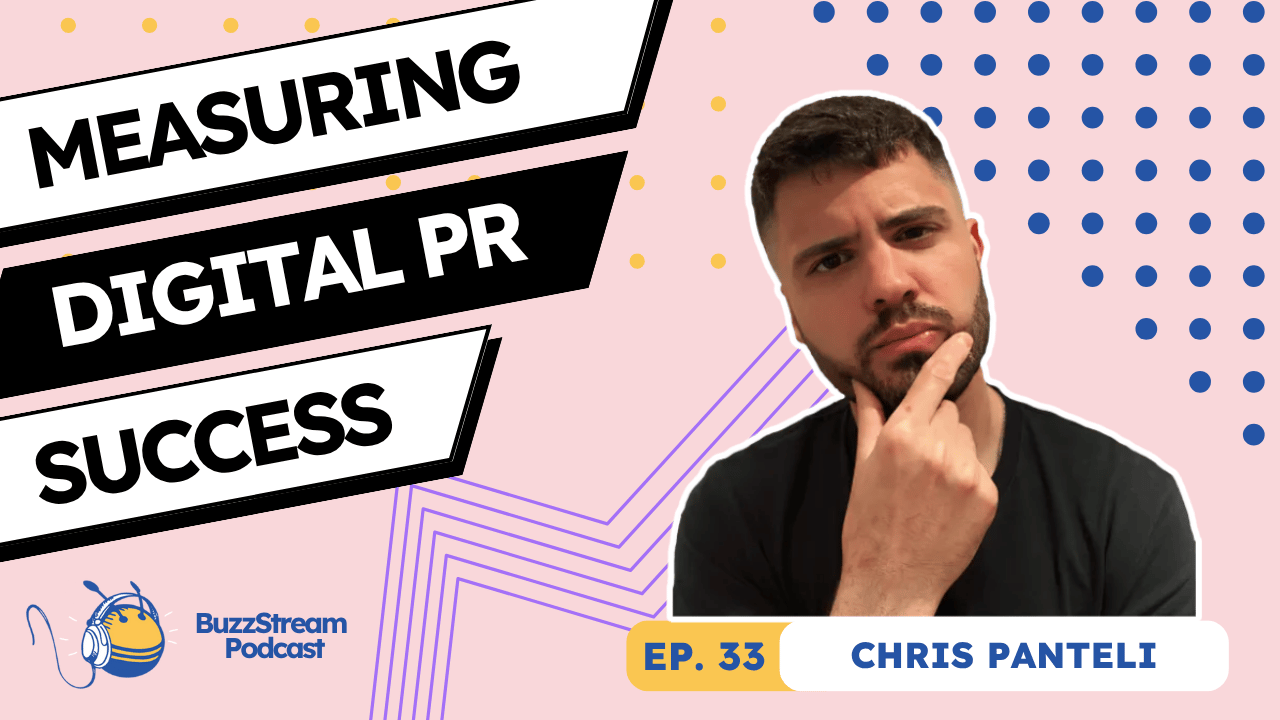
 Check out the BuzzStream Podcast
Check out the BuzzStream Podcast

